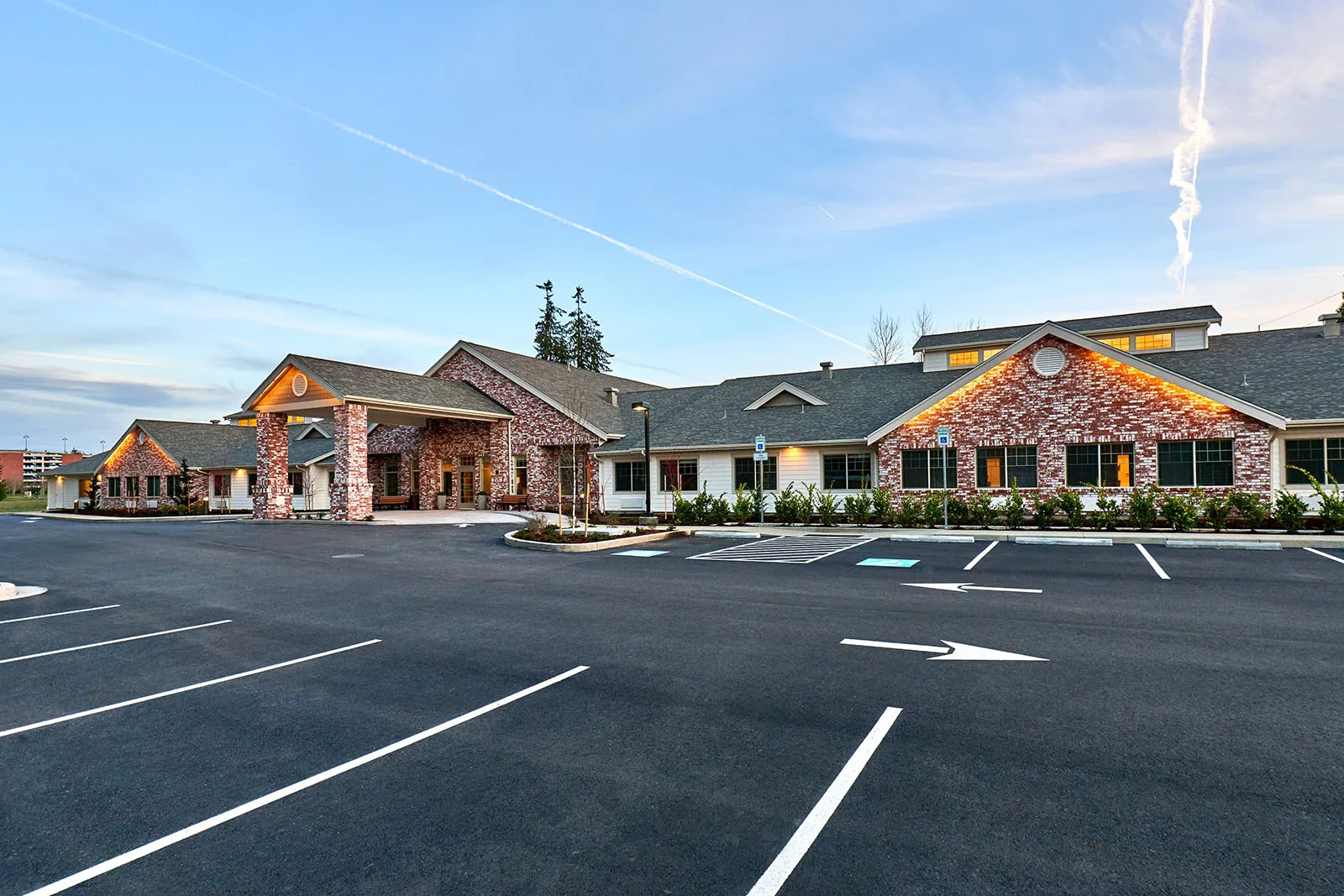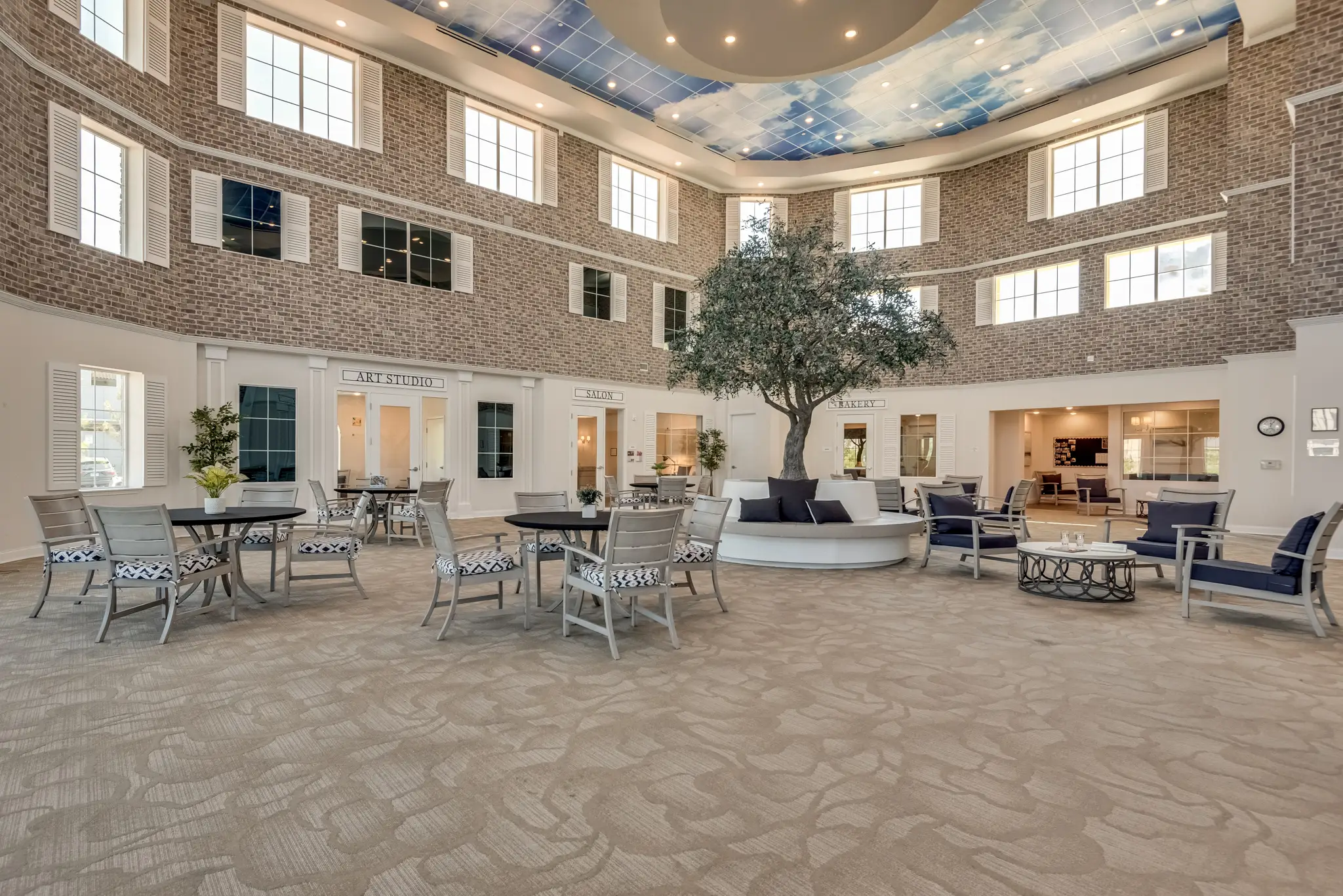Innovations in Memory Care and How It Enhances The Quality of Life for Seniors with Memory Loss

For our loved ones with Alzheimer's or dementia, memory care is often necessary to provide specialized care and support. At ONELIFE Senior Living, we combine advancements in healthcare, especially in memory care treatment, with innovations in residential hospitality to keep seniors engaged, families connected, and communities whole. Let's explore innovations in memory care and how they can enhance the quality of life for seniors with memory loss.
What is Memory Care?
Memory care is a distinct type of senior living that offers specialized assistance and care services to elderly individuals diagnosed with Alzheimer's disease or various other types of dementia. Memory care communities are designed to provide a safe and secure environment for seniors with memory impairments, with staff trained in specialized care techniques to support residents' unique needs. Memory care communities often provide various services, including medication management, assistance with daily living activities, and specialized programming and activities to support cognitive function.
Innovations in Memory Care
Over the years, there have been significant advancements in memory care treatment, resulting in innovative approaches to care and support. Here are some of the innovations in memory care that are changing the way we care for seniors with memory loss:
Person-Centered Care
In this care approach, the individual takes center stage in their care plan, focusing on acknowledging their distinct needs, preferences, and abilities. This approach to care recognizes that each person with memory loss is unique, with their own experiences, values, and interests. Memory care communities can provide individualized care and support that meets each resident's unique needs by taking a person-centered approach to care.
Person-centered care is a holistic approach recognizing that each person with memory loss is unique, with their own experiences, values, and interests. Memory care communities can provide individualized care and support that meets each resident's unique needs by taking a person-centered approach to care. In this care approach, we prioritize establishing a personal connection with the resident, genuinely getting to know them, their preferences, and their dislikes. By understanding them more profoundly, we can craft a customized care plan that caters to their specific requirements.
Person-centered care emphasizes a collaborative effort, bringing together family members, caregivers, and healthcare professionals as a unified team. This approach to care recognizes that the resident's family members are an essential part of their care team and involves them in the care planning process.
Technology
This innovative approach has completely transformed how we provide care for seniors experiencing memory loss, introducing a range of new tools and resources to enhance their well-being and support their overall care. For example, memory care communities may use virtual reality to provide residents with immersive experiences promoting cognitive function and engagement. Additionally, technology like sensors and wearables can help monitor residents' safety and well-being, alerting staff to any potential issues.
New technologies have been developed to help residents with memory loss stay engaged and active. As an illustration, let's consider the powerful impact of music therapy as a valuable tool in enhancing cognitive function and alleviating agitation among seniors grappling with memory loss. Memory care communities may use music therapy programs that are tailored to the resident's individual needs and preferences to help them stay engaged and active.
Another remarkable technological advancement that has demonstrated promising results is virtual reality, which has proven effective in boosting cognitive function and reducing agitation among seniors with memory loss. Virtual reality programs can provide residents with immersive experiences that promote cognitive function and engagement, such as virtual tours of museums or trips to exotic locations.
Environmental Design
Environmental design plays a critical role in memory care, with communities designed to provide a safe and supportive environment for seniors with memory impairments. Memory care communities often incorporate features like color-coded hallways, visual cues, and wayfinding signage to help residents navigate their environment safely and independently. Additionally, memory care communities may incorporate outdoor spaces like gardens and courtyards, providing residents with a safe and secure space to enjoy the outdoors.
Environmental design is an essential component of memory care, with communities designed to provide a safe and supportive environment for seniors with memory impairments. Memory care communities may incorporate features like color-coded hallways, visual cues, and wayfinding signage to help residents navigate their environment safely and independently. Additionally, memory care communities may incorporate outdoor spaces like gardens and courtyards, providing residents with a safe and secure space to enjoy the outdoors.
Specialized Programming
Specialized programming is a critical component of memory care, providing residents with activities and experiences that promote cognitive function and engagement. Memory care communities may provide a range of specialized programming, including art and music therapy, exercise programs, and social events and outings.
Specialized programming is an essential component of memory care, providing residents with activities and experiences that promote cognitive function and engagement. Memory care communities may provide a range of specialized programming, including art and music therapy, exercise programs, and social events and outings.
How Innovations in Memory Care Enhance the Quality of Life for Seniors with Memory Loss
The advancements in memory care have had a profound impact on enhancing the quality of life for seniors facing memory loss. These innovations have introduced new tools and resources to support their care and well-being. Here are some of the ways that innovations in memory care enhance the quality of life for seniors with memory loss:
Improved Safety and Security
Memory care communities are designed to provide a safe and secure environment for seniors with memory impairments, with features like color-coded hallways, visual cues, and wayfinding signage to help residents navigate their environment safely and independently. Additionally, technology like sensors and wearables can help monitor residents' safety and well-being, alerting staff to any potential issues.
Increased Engagement and Socialization
Specialized programming and activities are a critical component of memory care, providing residents with activities and experiences that promote cognitive function and engagement. By providing a range of activities and programming, memory care communities can help seniors with memory impairments stay engaged and active, promoting overall health and well-being.
We can unlock many remarkable benefits by fostering active engagement and involvement among seniors facing memory impairments. This includes noticeable improvements in cognitive function and a decreased risk of experiencing depression and other mental health challenges. Additionally, socialization is an essential component of memory care, providing residents with opportunities to connect with others and form meaningful relationships.
Individualized Care and Support
At the core of person-centered care is a deeply rooted philosophy that places the individual at the center of their care plan. This approach places utmost importance on acknowledging and valuing their unique needs, preferences, and abilities, ensuring that their care is truly tailored to them. Memory care communities can provide individualized care and support that meets each resident's unique needs by taking a person-centered approach to care.
By providing individualized care and support, memory care communities can help seniors with memory impairments feel more comfortable and secure, reducing their anxiety and improving their overall quality of life.
Improved Quality of Life
By providing a safe and supportive environment, specialized programming, and individualized care and support, memory care communities can help seniors with memory impairments live healthy, happy lives.
Assisted Living Costs and Veterans' Independent Living
For seniors who may need assistance with daily living activities but do not require the specialized care provided by memory care communities, assisted living is another form of senior living that provides support and care services. The expenses associated with assisted living can vary significantly, influenced by factors such as location and the level of care needed. On average, monthly costs for assisted living can range from $3,000 to $5,000, with supplementary fees for extra services and amenities.
For veterans and their spouses, there are additional resources that may be accessible to provide financial assistance in meeting the expenses of senior living. The VA Aid and Attendance Pension Benefit provides financial assistance to veterans and their spouses who require assistance with daily living activities, including memory care and assisted living. To be eligible for this valuable benefit, veterans must have served at least 90 days in active duty, with at least one day falling within a wartime period. Under this benefit, eligible veterans can receive financial support that can amount to $1,936 per month for a single veteran, up to $2,295 per month for a married veteran, and up to $1,244 per month for a surviving spouse.
Activities for Assisted Living Communities
Alongside the specialized care and support they offer, assisted living communities also provide a diverse array of activities and programs meticulously designed to foster holistic health and well-being. These activities may include:
- Exercise programs
- Arts and crafts
- Music therapy
- Gardening
- Pet therapy
- Games and puzzles
- Religious services
- Social events and outings
By providing a range of activities and programming, assisted living communities can help seniors stay engaged and active, promoting overall health and well-being.
ONELIFE Senior Living Memory Care Communities
ONELIFE Senior Living operates memory care communities across the United States. Each of these communities is designed to provide specialized care and support to seniors with memory impairments, with staff trained in the latest care techniques and programming designed to support cognitive function. Memory care communities can help seniors with memory impairments live healthy, happy lives by providing a safe and supportive environment, specialized programming, and individualized care and support.
In addition to memory care, ONELIFE Senior Living operates assisted living communities, including The Esther at Riverbend Assisted Living in Springfield, OR, and Middlefield Oaks Senior Living in Cottage Grove, OR. These communities provide various services and amenities to support seniors with various needs and preferences.
You can learn more about ONELIFE Senior Living and their memory care and assisted living communities here. Please reach out to our communities directly to schedule a tour.
Memory Care in Phoenix, Salem, Springfield, Beaverton, Cottage Grove, San Jose, Vernon Hills and Henderson
Choosing the right memory care facility for your loved one is a crucial decision. By understanding what memory care entails and considering the factors that make a great memory care community, you can ensure your loved one receives the best possible care. At ONELIFE Senior Living, we are here to support you every step of the way.
ONELIFE Senior Living offers exceptional memory care facilities in various locations throughout the country, including:
Phoenix, Arizona
Shadow Mountain Memory Care
Salem, Oregon
Battle Creek Memory Care
Springfield, Oregon
The Rawlin at Riverbend Memory Care
Beaverton, Oregon
Waterhouse Ridge Memory Care
Cottage Grove, Oregon
Middlefield Oaks Senior Living
San Jose, California
Sonnet Hill Senior Living
Vernon Hills, Illinois
The Laurel at Vernon Hills Memory Care
Henderson, Nevada
Vineyard Henderson Memory Care
Our communities are dedicated to providing a supportive and enriching environment for residents with memory loss. With personalized care plans, engaging activities, and compassionate staff, we strive to make our memory care communities a place where residents feel at home. Contact us today to learn more about our memory care facilities, and let us help you find the perfect home for your loved one.
Contact us
learn more about our
community

More Articles & Resources
EXPLORE THE ONELIFE COMMUNITIES




















